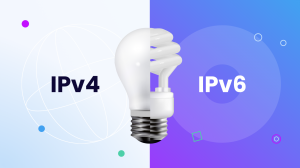Global adoption trends, energy efficiency, and coexistence strategies discussed for a smooth transition from IPv4 to IPv6.
— Vincentas Grinius, CEO of IPXO
LONDON, UK, July 17, 2023/EINPresswire.com/ — The enduring debates on comparing the Internet Protocol versions 4 and 6 (IPv4 and IPv6) have taken on a new turn in light of the growing global momentum around conservation and sustainability efforts, as well as the current worldwide energy crisis.
With concerns about energy consumption and the need for efficient utilization of resources, the discussions have become increasingly important.
While some argue that comprehensive IPv6 adoption is an ecological imperative, this perspective overlooks the significant progress being made in optimizing and “greening” IPv4 networks, which can contribute to addressing the electricity crisis and promoting sustainable practices.
As of July 2023, global IPv6 adoption has seen a significant increase of 15% over the past three years, as reported by Google’s IPv6 Statistics. There has been a remarkable growth in IPv6 adoption among Google users over the past decade, starting from negligible usage to nearly one-third of users by 2021.
The growth of IPv6 deployment gained momentum starting in 2014 and has continued gradually. However, it is crucial to recognize that IPv4 remains the dominant Internet protocol and will continue to be for the foreseeable future.
Based on slow yet stable IPv6 adoption rates, we can predict that it may take around a decade or even longer for the majority of internet connections to transition to IPv6, making IPv4 obsolete.
CONSIDERATIONS FOR IPv6 ADOPTION
The main appeal of IPv6 is its 128-bit address space, which enables trillions upon trillions of unique device addresses. Proponents argue the bandwidth and efficiency gains of this massive address pool make IPv6 inherently “greener” than the older 32-bit IPv4 system.
To delve deeper into the energy consumption battle between IPv4 and IPv6, visit https://bit.ly/3ObjqkS
However, this attribute alone ignores the real-world constraints and trade-offs required to overhaul and scale a new protocol on the Internet’s distributed architecture.
The resources required for a rapid global transition from IPv4 to IPv6 would be massive in terms of infrastructure, networking equipment, devices, and more. The installed base of IPv4 users, networks, and Internet of Things (IoT) devices numbers in the billions.
“Pragmatically speaking, forcing an abrupt shift is likely infeasible on both economic and ecological grounds. Gradual coexistence and compatibility of the two protocols is the most prudent path forward,” says Vincentas Grinius, CEO of IPXO, the next-gen IP address management platform.
SUSTAINABLE SOLUTIONS FOR INTERNET GROWTH
Fortunately, in the decades since its creation, engineers have optimized IPv4’s use of address space and enabled the protocol to evolve along with the growth of the Internet. Techniques like Network Address Translation (NAT) now allow multiple devices to share a single public IP address, drastically reducing consumption.
The steady march of virtualization, cloud computing, and software-defined networking has also enabled far more efficient infrastructure with less redundancy and waste. Critically, the inherent scarcity of IPv4 addresses has led to the development of a leasing market, where unused IPv4 address blocks can be temporarily loaned or transferred.
“Contrary to assumptions, the IPv4 address market enables more sustainable Internet growth, especially in developing regions. It allows new networks and providers to come online using available IPv4 assets, rather than necessitating the deployment of entirely new IPv6 frameworks”, explains Grinius.
In engineering terms, IPv4 leasing enables higher utilization efficiency of existing scarce resources. In environmental terms, the leasing of IPv4 addresses prolongs the life cycle of the large hardware and software installed base of IPv4. And in business terms, it offers network operators a pragmatic return on investment strategy.
Each of these factors demonstrates how using leased IPv4 addresses wisely can help create a sustainable Internet infrastructure.
IPv4 AND IPv6 IN COEXISTENCE
Some may contend that this pragmatic approach just “kicks the can down the road” on eventual IPv6 adoption. However, as already mentioned before, even the most optimistic projections expect IPv4 to maintain a majority share of Internet traffic well into the 2030s. The Internet in the field evolved gradually over decades, not overnight. Forcing a premature switchover ignores the pragmatic efficiency gains of “IPv4-first” policies in the near term.
“Looking ahead, it is likely that the Internet will consist of a combination of both protocols working together, creating an ecosystem. IPv4 will continue to support older devices and networks, while IPv6 will gradually expand as new networks emerge,” argues the CEO of IPXO. This coexistence period allows for careful planning and a smooth transition rather than sudden and disruptive changes.
BUILDING SUSTAINABLE NETWORKS
Mandates demanding an immediate transition to IPv6 are often put forth by organizations and research communities involved in setting standards. However, professionals working with real-world networks understand the continued benefits of the practical approach offered by IPv4.
“Criticisms that portray IPv4 as inherently wasteful overlook the substantial optimization and sustainability achievements made by IPv4 providers. Rather than a binary all-or-nothing choice between the two protocols, network engineers should pursue conservation and efficiency efforts across both,” believes Grinius. The prudent path involves using IPv6 for new networks while maximizing the lifespan of existing IPv4 assets through creative leasing and virtualization techniques.
“Sustainable networks require adaptation, not dogma. The future of IPv4 remains bright, as its longevity demonstrates the enduring power of the practical path.”
ABOUT IPXO:
IPXO is a leading Internet Protocol address management solution and intelligence hub, specializing in comprehensive solutions and services. The company is at the forefront of addressing industry challenges such as IPv4 shortage, IPv6 adoption, management obstacles, IP defragmentation, and routing automation. With potential access to a vast number of 3.2M IPv4 addresses and a strong presence within the RIR community, IPXO is emerging as the business-critical infrastructure platform for enterprises worldwide. For more information, visit www.ipxo.com.
Agne Srebaliute
IPXO LLC
email us here
![]()





















